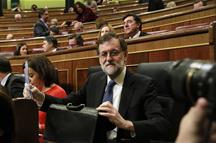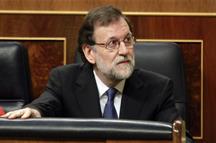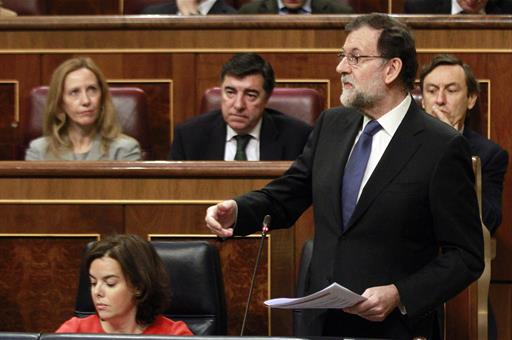"Basic" goal for Brexit negotiations is to avoid "harming people", says Mariano Rajoy
President's News - 2017.4.5
Lower House of Parliament, Madrid
The President of the Government replied to a question from the Socialist Party representative, Antonio Hernando, about the Brexit process by stating that "the European Union will negotiate" the withdrawal by the United Kingdom "as a block", meaning "there will be no individual negotiations".
The President of the Government recalled that the basic goal is to avoid "people being harmed". He went on to explain that "the terms of the withdrawal are negotiated first, then we will start to talk about the future relationship". In his opinion, "nothing is agreed until everything is agreed".
As he recalled, the "guidelines" drawn up by the President of the European Council, Donald Tusk, propose "a broad and far-reaching free trade agreement" as well as agreements in terms of security, defence, the fight against terrorism and organised crime.
The letter from the United Kingdom
The PNV [Basque Nationalist Party] representative, Aitor Esteban, asked about the content of the letter that the United Kingdom sent to the EU expressing its decision to withdraw. In this regard, the President of the Government replied that "the general tone seeks to be constructive" as it states both "a need for the process to be fair and ordered" and "a desire to maintain positive relations in the future on economic and security issues".
 Pool Moncloa/J.M. CuadradoNonetheless, Mariano Rajoy also said that "the very fact of withdrawing from the European Union" and "the intention expressed in the letter to negotiate the withdrawal and the future relationship in tandem" do not seem "so positive" to him.
Pool Moncloa/J.M. CuadradoNonetheless, Mariano Rajoy also said that "the very fact of withdrawing from the European Union" and "the intention expressed in the letter to negotiate the withdrawal and the future relationship in tandem" do not seem "so positive" to him.
As regards "the fight against crime and terrorism", Mariano Rajoy acknowledged that "this could be weakened if certain requirements are not met".
In terms of the role played by the Ertzaintza [Basque Police Force], he recalled that "Spain's representation at various international bodies is a State responsibility", as stated in the Statute of Autonomy of the Basque Country and the Spanish Constitution.
At any event, the President of the Government explained that access to "international information of police interest and the actions by the Ertzaintza with police forces in other countries are taking place as normal".
Catalonia
In response to a question from Gabriel Rufián, a Member of Parliament for ERC [Republican Left of Catalonia], Mariano Rajoy stressed that the Government of Spain intends to meet the needs of Catalonia. "We have tried to tackle the most important issues for the people and we will continue to do so in the future", he said.
Of those issues, "the first main objective was job creation", explained the President of the Government. In this regard, he recalled that the latest unemployment figures published were "highly positive for Spain as a whole, as well as for Catalonia". In other words, "the jobs lost during the economic crisis are gradually being recovered".
The President of the Government added that "fundamental public services" (healthcare, education and social services) were also maintained in spite of the "extremely difficult situation that the Regional Government of Catalonia found itself in". Mariano Rajoy pointed out that the Government of Spain implemented "liquidity instruments" to this end, such as the FLA [Regional Liquidity Fund] and the Supplier Payment Fund.
 Pool Moncloa/J.M. CuadradoMariano Rajoy also referred to the public investments made in Catalonia. He said that these were maintained during the "tough times" and will start to increase from now on, given that "revenue has increased because of improvements in economic activity".
Pool Moncloa/J.M. CuadradoMariano Rajoy also referred to the public investments made in Catalonia. He said that these were maintained during the "tough times" and will start to increase from now on, given that "revenue has increased because of improvements in economic activity".
After stressing that "it would be good" for Catalonia to take part in the debate on regional financing that began recently, the President of the Government, Mariano Rajoy, stated that the public employment offer recently approved by the Government of Spain to convert interim employees into full-time employees after they pass the corresponding exams "affects 30,000 people in Catalonia".





